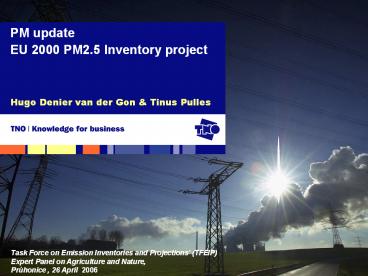Hugo Denier van der Gon - PowerPoint PPT Presentation
1 / 16
Title:
Hugo Denier van der Gon
Description:
Hugo Denier van der Gon & Tinus Pulles. PM update. EU 2000 PM2.5 Inventory project. Task Force on Emission Inventories and Projections' (TFEIP) Expert Panel on ... – PowerPoint PPT presentation
Number of Views:45
Avg rating:3.0/5.0
Title: Hugo Denier van der Gon
1
Hugo Denier van der Gon Tinus Pulles
- PM update
- EU 2000 PM2.5 Inventory project
Task Force on Emission Inventories and
Projections' (TFEIP) Expert Panel on Agriculture
and Nature, Pruhonice , 26 April 2006
2
Outline
- Background of the project
- Approach
- Expected results
- Time table
- Discussion points
3
Background
- The European Commission
- is preparing for a revision of the National
Emission Ceilings Directive in 2006. - NEC
establishes national limits on the emission that
can be emitted in a particular target year - considers introducing national emission ceilings
for PM2.5. - To enable this, an accurate emission inventory of
primary PM2.5 in the 25 EU Member States,
acceding countries (Bulgaria, Romania) and
Candidate Countries (Croatia, Turkey, FYR of
Macedonia) is needed. - Consortium
- TNO (NL, lead organisation)
- NETCEN / AEAT (UK)
- IVL (SW)
- Related project PM2.5 Guidebook update
commissioned by EC / DG Env.
4
Approach Build Generalized Inventory in
relational database structure
TNO Emissions Assessment Model TEAM
- To improve transparency direct link to
Guidebook development - Allowing identification of SNAP technologies and
NFR sector codes - Select_Techn links Activity to Technology
allowing country-specific EFs - Easy transformation of the data to other formats
(e.g. RAINS)
5
ApproachFirst order draft inventory
Derived from the CEPMEIP study
6
ApproachFirst order draft inventory and
uncertainty analysis
- Key Source analysis
- Monte Carlo simulation to identify
- the uncertainties for each country
- the most important contributions to this
uncertainty - Objective
- direct the national experts attention to the
major problems
7
ApproachLiaison with Guidebook project and
TFEIP co-chairs
8
ApproachConsultation with national experts
9
ApproachSecond order draft based on comments
additional information of national experts
Review of 2nd O Draft, workshop screening
result in Final PM2.5 inventory
- Including a second draft
- Key source analysis
- Uncertainty
- Report, describing the inventory
One day workshop ?
10
Expected result
- EU25 wide PM2.5 Emission Inventory that is
- Transparent
- Comparable
- Consistent
- Complete
- Accurate
- Provides all necessary information on key sources
and uncertainties - Can be used to develop emission ceilings
11
The expected resultthe EU25 PM2.5 Inventory and
the RAINS model
12
Time line 2006
- March / April
- Consultation with TFEIP expert panels
- Preparation of first order draft activity data
done - emission factors in progress
- Pre-first order ready
13
(No Transcript)
14
Time line 2006
- March / April
- Consultation with TFEIP expert panels
- Preparation of first order draft activity data
done - emission factors in progress
- May / June / July
- Consultation with National Experts
- July / August
- Preparation of second order draft
- September / October
- Discussion of Second order draft
15
What should be included in the inventory?
All emissions where the hand of man is
involved
PM10 PM2.5 PM2.5-10 - but do we know the
split?
- For combustion processes good defaults available.
- For all non-combustion processes with PM2.5
fraction is 0-80 of PM10 we have a poor
understanding. Research focus has been PM10, too
little and possibly not applicable data for
PM2.5 (e.g. the US situation may not apply). - Excluded resuspension cannot exclude arable
farming - Examples of uncertain sources handling of bulk
materials, construction sites, diffuse industrial
emissions, agricultural management, wind blown
dust from arable farming .In the literature
the PM2.5 fraction in PM10 soil varies from 0
50 - Here to introduce pick up the state of the
art and/or consensus concerning agricultural PM
emissions for what is lacking we will make a
proposition
16
Fraction PM2.5 arable farming emissions
- Goossens et al. 2001 - Field experiment at
Grönheim (Germany) local emission (either by
tillage or wind erosion ) D50 always gt 30 um. - Chandler et al. (2002) (Washington state, US)
30-55 of PM10 is PM2.5.indicating significant
air quality impacts by wind erosion on this
region. - Matsumura et al. (1996) found a PM2.5/PM10 ratio
of 0.18 0.12 for dust measurements at the
downwind edge of a field during harvesting and
land preparation activities. - Varies from 0 20 50
17
PM2.5 from arable farming What can we assume
for the Netherlands?
PS. Crustal material is not well-defined in
emission inventories. So you may know the
fraction in PM2.5 but w/o the absolute emission
strength
18
- Thank you for your attention!
- More info, remarks?
- Hugo.deniervandergon_at_tno.nl
- Tinus.pulles_at_tno.nl































